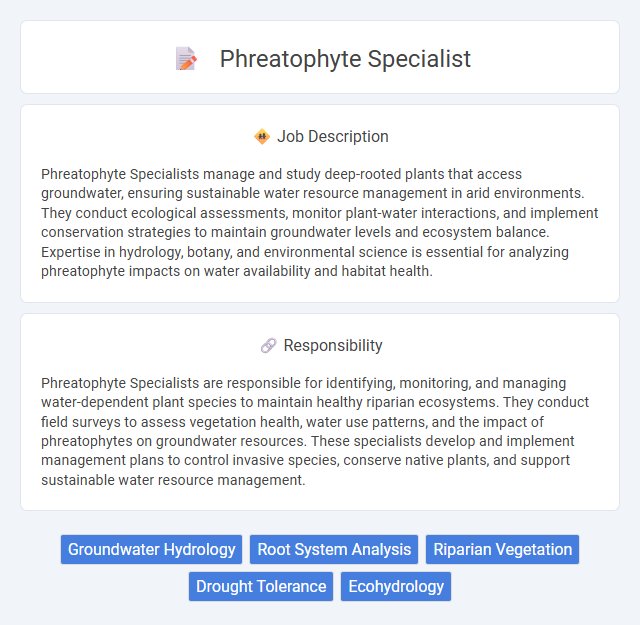
Phreatophyte Specialists manage and study deep-rooted plants that access groundwater, ensuring sustainable water resource management in arid environments. They conduct ecological assessments, monitor plant-water interactions, and implement conservation strategies to maintain groundwater levels and ecosystem balance. Expertise in hydrology, botany, and environmental science is essential for analyzing phreatophyte impacts on water availability and habitat health.
Individuals with a strong interest in environmental science and plant ecology are likely suitable for a Phreatophyte Specialist role, especially those comfortable working outdoors in various weather conditions. Candidates with physical stamina and an ability to conduct fieldwork in remote or challenging terrains may find this job more fitting. Those who prefer indoor or desk-based work might have a lower likelihood of feeling well-suited for the practical demands of this position.
Qualification
Phreatophyte specialists require in-depth knowledge of hydrology, botany, and soil science to effectively manage water-dependent vegetation. Qualifications typically include a bachelor's or master's degree in environmental science, ecology, or related fields, complemented by experience in plant identification and water resource management. Proficiency in GIS technology, data analysis, and regulatory compliance further enhances their ability to assess and conserve phreatophytic plant communities.
Responsibility
Phreatophyte Specialists are responsible for identifying, monitoring, and managing water-dependent plant species to maintain healthy riparian ecosystems. They conduct field surveys to assess vegetation health, water use patterns, and the impact of phreatophytes on groundwater resources. These specialists develop and implement management plans to control invasive species, conserve native plants, and support sustainable water resource management.
Benefit
Phreatophyte specialists likely benefit from contributing to water conservation efforts by managing deep-rooted plants that access groundwater. Their expertise may improve ecosystem stability and help mitigate soil erosion, supporting environmental sustainability. Opportunities for fieldwork and research could enhance practical experience and career growth in ecological and hydrological sciences.
Challenge
Phreatophyte Specialist roles likely involve complex challenges related to managing and conserving water-dependent plant species in arid environments. Effective solutions probably require balancing ecological preservation with water resource management under shifting climate conditions. Navigating regulatory frameworks and coordinating multidisciplinary teams may also present significant obstacles in this field.
Career Advancement
Phreatophyte Specialists play a crucial role in managing water resources by studying deep-rooted plants that access groundwater. Career advancement opportunities include moving into senior environmental analyst positions, natural resource management roles, or specialized consultancy in hydrology and ecology. Expertise in remote sensing technology, GIS mapping, and environmental policy can significantly enhance promotional prospects within governmental agencies and environmental firms.
Key Terms
Groundwater Hydrology
Phreatophyte Specialists analyze the interaction between groundwater and phreatophyte vegetation to understand water consumption patterns and improve groundwater management. Expertise in groundwater hydrology allows these specialists to assess the impacts of vegetation on aquifer recharge rates and water table fluctuations. Their work supports sustainable water resource management by integrating ecological data with hydrological models.
Root System Analysis
Phreatophyte Specialists conduct detailed root system analysis to assess water uptake efficiency and soil moisture dynamics in riparian ecosystems. Their work involves mapping root depth, density, and distribution to understand phreatophyte interactions with groundwater resources. Advanced techniques such as ground-penetrating radar and stable isotope tracing optimize studies of root hydraulics and plant-water relationships.
Riparian Vegetation
Phreatophyte specialists focus on managing and studying riparian vegetation, which consists of water-dependent plants located along riverbanks and streams. They analyze groundwater-surface water interactions to ensure the health of these ecosystems, enhancing water quality and habitat stability. Their expertise supports sustainable water resource management and conservation of riparian habitats critical for biodiversity.
Drought Tolerance
Phreatophyte specialists analyze plant species that thrive on deep groundwater sources, emphasizing adaptations for drought tolerance and water scarcity resilience. They assess root structures and physiological traits enabling these plants to sustain growth during extended dry periods. Their expertise supports water resource management and ecological restoration in arid and semi-arid environments.
Ecohydrology
Phreatophyte specialists analyze vegetation that relies on groundwater, playing a critical role in ecohydrology by studying water uptake patterns and their impact on aquifer recharge and surface water systems. Their expertise supports sustainable water resource management and habitat conservation, particularly in arid and semi-arid regions. Using remote sensing and hydrological modeling, they assess phreatophyte distribution and ecosystem water balance to inform environmental policy and restoration projects.
 kuljobs.com
kuljobs.com